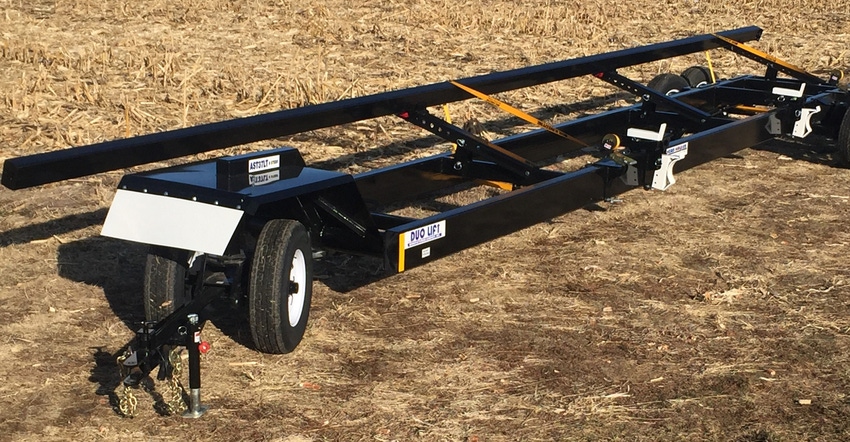
Duo Lift Manufacturing Co. of Columbus, Neb., has offered Head Hauler trailers for hauling combine headers for more than 20 years. However, as farmers have dealt with increasingly difficult turns while hauling bigger headers, Paul Hottovy, director of sales at Duo Lift, notes the company was getting more requests to produce its own four-wheel steer header trailers.
However, Hottovy notes, the company wanted to take a different approach to four-wheel steer trailers.
"Admittedly, we were one of the last major combine header trailer manufacturers to come out with any kind of four-wheel steer," he says. "Part of that was we wanted our four-wheel steer and now six-wheel steer to have the same towing and loading characteristics that our dealers and customers have come to trust and expect.
"Prior to four- and six-wheel steer, we've been known for a heavy-duty adjustable header trailer that can be adjusted to all the header types. The other thing we were known for is our trailers will tow smooth and straight without wiggle and wander at appropriate dirt road, gravel road or highway speeds."
At Husker Harvest Days in 2018, Duo Lift unveiled its first All Steer Head Hauler trailers with four-wheel steering. A year later, in December, Duo Lift unveiled a version with six-wheel steer with tandem rear axles.
This includes its AST37LT, AST37XL, AST42LT, AST42XL, AST47LT and AST47XL models. DOT-compliant All Steer Head Hauler trailers also will be available in the first quarter of 2020.
Duo Lift's four- and six-wheel steer trailers build on the components that make up its regular header trailers, with a front dolly wheel and tongue assembly and narrower front-wheel track, rather than a wider front-wheel track, to improve maneuverability.
"We started with that, but what's unique is the front dolly wheels have a steering mechanism hooked to them called a steering rod, and that steering rod goes in and out as you turn," Hottovy says. "That rod goes into a pivoting steering arm, and that steering arm pulls and pushes a tie rod that is connected to a steering axle segment on the right-hand side of the trailer, and that steering segment is hooked to the first left-hand steering segment by a tie rod."
"That formed the basis for us to add a second right-hand steering segment and a second left-hand steering segment," he adds. "Those steering segments are all torsion suspension axle. Those steering segments are secured to the trailer and have their own pivot. They're hooked together so when one steers the other one steers. Then we join the rear pair to the front pair with a tie rod."
With six-wheel steering, Hottovy notes the trailer can handle modern, heavyweight headers without having to make wider turns.
"The industry so far has only had a wide front axle, a wide rear axle that hooks together and steer. With only four sets of tires, you only have so much capacity," he says. "Technically, when you add up those four tires, 3,400 or 3,500-pound max carrying a capacity multiplied times four, you're not supposed to carry more weight than that. You can take a good trailer and put a heavy header on it and make it look like it's sinking into the ground."
Hottovy says trailer maneuverability is highly sought after by growers hauling 35-, 40- or 45-foot headers — especially when fields are far away and tight corners are involved.
"There are fewer farmers farming more ground farther from the home base — it's often farmland that's rented, and the landowner might not want to make a wider entrance to the field," he says. "They have to be extraordinarily careful moving these large headers and turning into farm fields from highways and gravel roads.
"The six-wheel steer gives the maneuverability of the four-wheel steer, but gives appropriate capacity to carry modern headers. The six-wheel steer allows that whole trailer to steer and follow behind a four-wheel drive extended cab pickup. It's like a tame calf being led by a halter and rope."
Depending on the length and options, six-wheel steer models range from $12,000 to $16,300 in price. To learn more, visit duolift.com.
About the Author(s)
You May Also Like






